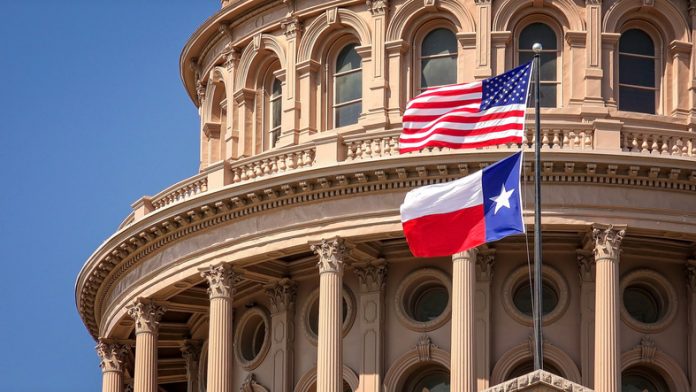Texas gets ‘C’ grade for fiscal health due to state and local government debt from Truth in Accounting.
By Bethany Blankley
(The Center Square) – As voters head to the polls on Tuesday with tens of billions of dollars in proposed city, county and ISD bond and property tax increase propositions on their ballots, Texas got a ‘C’ grade for its financial health, according to a new ranking.
Texas ranks 30th out of 50 states analyzed for fiscal health in Truth in Accounting’s newly released 14th annual Financial State of the States report. Data analyzed comes from Texas’ 2022 audited Annual Comprehensive Financial Report and retirement plans’ reports.
TIA found that Texas had $147.6 billion in revenue to pay $186 billion worth of bills, according to the data. To cover the difference, each taxpayer would owe $4,300 to cover Texas’ more than $38 billion worth of debt.
As in previous years, and as is the case for most states, Texas’ “unfunded pensions and other employee retirement obligations continued to plague the state,” the report explains.
“Over the last two years, the value of Texas’ pension investments has been subject to the volatility of the markets. In 2021, financial markets improved, and the state’s pension system’s investments reported significant gains. Unfortunately, the market conditions turned negative during fiscal year 2022, resulting in significant investment losses, which in turn caused the amount of unfunded promised pension benefits to increase. This volatility highlights the risk to pension systems and taxpayers when fixed benefits are partially funded by earnings from erratic markets.
”Texas has nearly $54 billion in unfunded pension benefits and more than $59 billion in unfunded retiree healthcare benefits,” according to the report.
Possibly adding to Texans’ debt, which is not included in the report, are over 140 bond propositions on the Nov. 7 ballot. At least seven counties and 16 cities have a minimum of $6.6 billion worth of 30-40-year bonds (principal only) on the ballot.
At least 86 public school ISD bond propositions total over $17 billion (principal only, excluding interest and current debt obligations), and billions of dollars’ worth of new property taxes proposed through VATREs (Voter Approved Tax Ratification Election) are also on the ballot.
The five largest Texas Independent School District bond propositions total nearly $17 billion (debt principal only). When current debt obligations are included, the total climbs to over $24.7 billion.These five districts had 186,141 enrolled students in the 2021-2022 school year; 33% to 90% of them were economically disadvantaged.
In some cases, bond interest is higher than the principal. Midland ISD’s proposed bond, for example, is over $1.4 billion in principal and over $1.5 billion in interest, on top of its outstanding debt obligations.
Prosper ISD’s bond proposition (Collin and Denton counties) is over $7.6 billion in total debt obligations.
Two of the smallest ISDs proposed $200 million in combined debt obligations for less than 750 students.
ISD bonds and VATREs would be funded by increasing property taxes. Most of the ISDs promoting the bonds claim residents will “have $0 tax impact” or “no new tax rate” and the bonds are needed for students’ “safety and security.”
Amy Hedtke, a leader with Texans for Freedom, who launched an advocacy campaign called, “It’s OK to vote NO” against the bonds, says such claims are “deceptive.” Any decrease in property taxes is because of legislative reform, she and state lawmakers argue. The bonds “deceptively dip into that much-needed relief, making it less effective,” Hedtke says. “A vote against it will result in a bigger tax decrease for families. Future tax bills over the 40-year bond authorization will be higher.
”Opponents also argue decades worth of debt and increased property taxes have not improved public school learning outcomes.
Mary Lowe, co-director of Families Engaged, an organization that advocates for teachers, students and parents, says throwing more money at a failed education system hasn’t and won’t solve Texas’ education issues. The overwhelming majority of students, 70%, are failing at their grade level in reading and math. The statewide average of Texas students who are proficient at reading and math at their grade level is only 30%.
“Citizens should ask why the solution always seems to be to spend more money at the taxpayer’s expense with no accountability and no return on their investment,” she told The Center Square.
“Students do not need flashy, Taj Mahal buildings in order to receive a quality education.”“We can’t expect people who can’t read and write to absorb a future debt,” she adds.
If the ISD bonds pass, five-year old students would be paying off their district’s debt when they are between 35-45-years old; 10-year-old students, when they are 40-50-years old; 18-year-old students, when they are 48-58 years old. These debt obligations exclude future debt and tax increase obligations.
Originally published by The Center Square. Republished with permission.
For more great content from Budget & Tax News.











